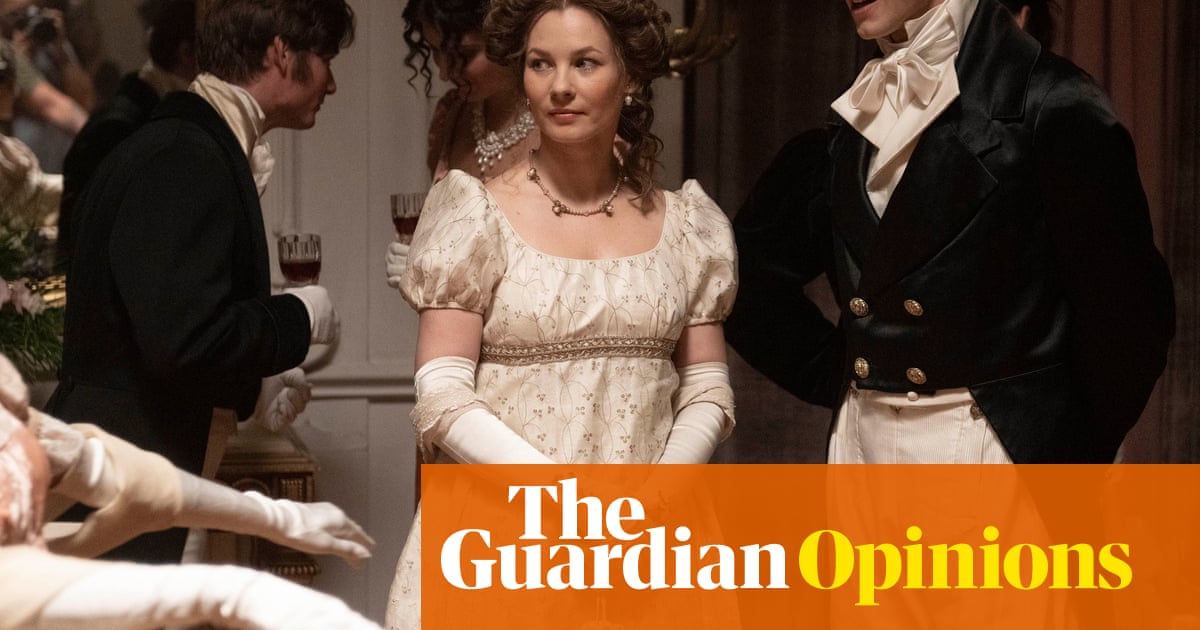Igrew up as the daughter of an imam in a conservative British-Pakistani community inBradford. Our early years were spent in a large Victorian terrace owned by the local mosque council. When my father was replaced, we downsized overnight to a much smaller house on the other side of town. The loss of a beloved home, close friends and community was a deeply disorienting experience.
Decades later, directing the new BBC seriesJane Austen: Rise of a Genius, I found myself thinking back to that time. On the surface, my life and Jane Austen’s couldn’t be more different – an English novelist born in the 18th century and a working-class British-Pakistani woman. Austen’s novels had always resonated with me when I read them as a girl. But learning moreabout her life as part of my director’s prep, I realised just how many shared realities we had. I saw how similar Austen’s family dynamics were to my own a couple of centuries down the line. When Austen’s father stepped away from his post as a clergyman, it forced the family to leave their genteel rectory home for a series of ever more insecure living quarters. Though separated by culture, time and geography, like Austen I understood early the brutality of economics and just how vulnerable a family can become when its financial foundation is shaken.
Devouring Austen’s work as a teenager, I appreciated not just the storytelling but the survival tactics – strategies women used to maintain their dignity in a world that offered them very little agency. Growing up as a young woman from a Muslim background, I sometimes lived in the shadows, within the quiet restrictions and expectations of duty. I wanted to scream my rage into the abyss as I gingerly walked a tightrope between obedience and self-determination.
Reading those novels, it wasn’t the ballrooms and the bonnets that spoke to me, but the stakes. They captured the emotional cost of a world in which women had limited options and where marriage was more often an economic contract than a love story. This was something I had seen first-hand in many of thearranged marriages of the women around me.
Though my father, like Austen’s, passionately advocated for women’s education, in our wider community education for girls was not widely encouraged. Teachers in my inner-city school were predominantly white, middle class and from posher postcodes. They assumed that as young Pakistani girls we would disappear into early marriages, and some didn’t bother to hide their low expectations. That condescension stung. It made me hungry to prove them wrong, and to challenge whenever I could.
Austen taught me that the domestic sphere could be radical. Her characters weren’t obvious revolutionaries, but women who, through wit, tenacity and endurance, reshaped their own lives. My grandmother, widowed early, chose not to remarry, thereby ensuring her autonomy. It was a rare and courageous decision in her 1960s rural Kashmiri village. The memory of my grandmother’s bold and brilliant choice lies in the very fabric of my DNA. Austen’s cousin Eliza was also a woman who instinctively understood the power her widowhood afforded her to live by her own rules. It was an important lesson in how an intelligent woman with her wits about her could cleverly navigate and confound societal expectations. A lesson not lost on a youngJane Austen.
Like Austen, I too have a large brood of siblings, and our home was noisy and full of stories. We couldn’t afford expensive outings, but my father’s bookcases groaned under the weight of his book collection: dusty encyclopedias, Islamic jurisprudence and Urdu translations of Rumi. I knew books were the portal to other worlds, other possibilities, and Iread everything.
Storytelling became an early refuge. I made my siblings act in hastily put together skits, all filmed on a clunky VHS recorder my parents could hardly afford, but which, like Austen’s writing desk, was a crucial gift. Even then I was crafting scenes, directing chaos into meaning.
Coming back to Austen’s work as a film-maker, I saw what I hadn’t as a teenager: the sharpness of her observations, her critiques of social climbing and conformity, the feminist undertones, the devastating awareness of how class, gender and power intertwine. As I dug deeper into Austen’s life, I began to understand more why her work had struck such a chord with me as a teenager. While she wrote about women with seemingly limited options, it was always with a great deal of wry wit and a sense of hopefulness. I found inspiration in Austen’s humour, and to this day my sisters and I still refer to our mum as Mrs Bennet in a nod to her impassioned pleas for us not to dismiss potential suitors.
Most importantly, Austen left behind stories of female protagonists struggling with daily compromises to survive that still resonate with women today. The idea that it is possible to live truthfully. In Persuasion, Anne Elliot finds the strength to choose for herself after years of silence. That journey hit close to home. I didn’t follow the expected path. I delayed marriage. I pursued education and entered a competitive, creative field where people like me were rarely seen. Telling Austen’s story has felt deeply personal. It is a reclamation of the girl who once sat in her bedroom window reading Emma while the sound of Friday prayers echoed in the background. A tribute to her voice and my own hard-fought one.
Austen’s power, quiet but enduring, transcends time and cultural identity. Marking her 250th birthday isn’t just about remembering a literary icon, but about recognising that across the centuries, some battles remain the same. And if that’s not something a girl from Bradford can relate to, I don’t know what is.
Ali Naushahi is a TV director and writer
